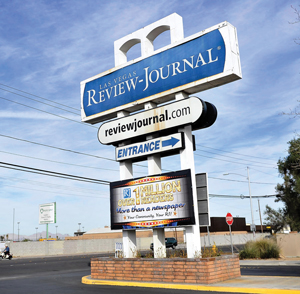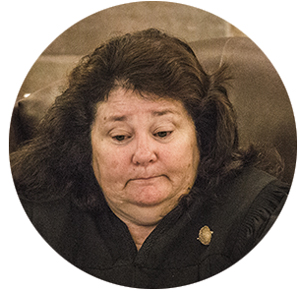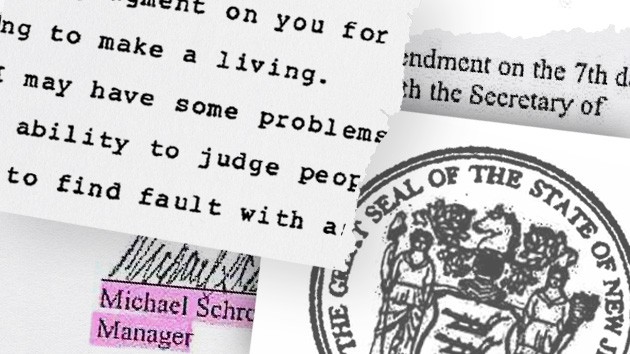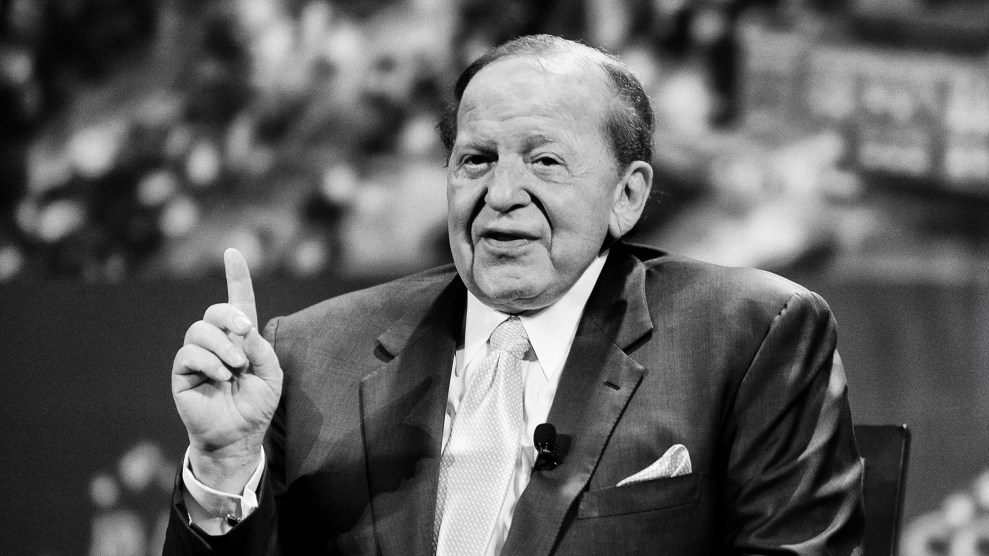
Kin Cheung/AP
In December, journalists at the Las Vegas Review-Journal were told that their paper had been sold—and that they wouldn’t be told who the new owners were.
The move touched off a nationwide guessing game, with speculation soon turning to local billionaire Sheldon Adelson. At first, the casino magnate rebuffed questions, before finally confirming his involvement.
That put an end to that mystery, but plenty of others surrounding the sale remain: How did a group of Review-Journal reporters end up tasked with an unorthodox investigation into a local judge trying a case vital to Adelson? And how did an article critical of that judge end up running in a Connecticut newspaper under a fake name?
But the most important question of all is why, exactly, did the political megadonor made the purchase? His family maintains it was an investment, but hardly anyone would argue the American newspaper industry is a safe financial bet in 2016. Was it to push his agenda in the 2016 presidential race? Or was it to take control of a local watchdog that has often been an irritant?
Adelson and his company, Las Vegas Sands, are major players in the city’s economy and politics, and since the mogul purchased the Review-Journal, the paper has wrestled with how to fairly cover its owner and disclose his many interests. Read all about it below, and make sure to read our accompanying cover story on Adelson, too:
| Spring 2015 |
An emissary quietly approaches GateHouse Media, the owners of the 106-year-old daily Las Vegas Review-Journal, on behalf of Sheldon Adelson. 
David Becker/Zuma Press
|
| September 21 |
News + Media Capital Group forms as a Delaware corporation. The paperwork lists Michael Schroeder, the publisher of a small chain of Connecticut newspapers, as the company’s manager. It will be three months until Adelson admits his family controls the company. |
| September |
Schroeder offers a freelance reporter $5,000 to write an article on Nevada judges for one of his Connecticut papers. During the meeting, Schroeder mentions Adelson’s name and provides a 40-page “dossier” of court documents and newspaper clips. The reporter turns down the assignment, later telling the Huffington Post that it sounded too unorthodox. |
| Early November |
A GateHouse executive calls a top editor at the Sarasota Herald-Tribune, another GateHouse paper, with a story tip involving Las Vegas judges. The editor refuses to have his reporters investigate. “We just didn’t have the resources,” he later said. “There were too many questions that still needed to get resolved.” |
| November 4 |
The Nevada Supreme Court denies Adelson’s push to have Judge Elizabeth Gonzalez removed from former Sands executive Steve Jacobs’ wrongful-termination lawsuit against Adelson. Gonzalez had clashed with Adelson when he refused to answer questions on the stand: “Sir, you don’t get to argue with me,” she said. “Do you understand that?” 
Jeff Scheid/AP
|
| November 6 |
Over editors’ protests, GateHouse orders a group of Review-Journal reporters to drop everything and investigate several Las Vegas judges. The reporters eventually file 15,000 words of notes on three judges, including Gonzalez. |
| December 1 |
While none of the team’s reporting ever appears in the Review-Journal, two small Connecticut papers owned by Schroeder publish an article under the byline of Edward Clarkin that excoriates Gonzalez’s handling of the Adelson case. |
| December 10 |
GateHouse sells the Review-Journal to News + Media Capital Group for $140 million. The price is two to three times the paper’s estimated value, driving speculation that Adelson is the purchaser. Schroeder tells the newsroom that the new owners “want you to focus on your jobs…Don’t worry about who they are.” That night, according to the Huffington Post, publisher Jason Taylor stops the presses as an article on the sale is revised to deemphasize questions about the mystery buyer. |
| December 15 |
Adelson sits in the front section as his Venetian resort hosts a Republican presidential debate. He denies to CNN’s Brian Stelter that he’s bought the paper, saying he has “no personal interest.” |
| December 16 |
Adelson and his family are finally revealed as the Review-Journal‘s new owners but insist in an open letter that they always intended to come forward and had bought the paper as an investment with no plans to meddle in its management. Despite these assurances, Taylor requires reporters and editors to get approval before covering Adelson or the sale. |
| December 18 |
The Review-Journal publishes an article detailing how its reporters were tasked with the judicial investigation. The article also explores ties between Schroeder, the newspaper group’s manager, and the Edward Clarkin article slamming Gonzalez. It notes that Clarkin’s byline previously only appeared as a restaurant reviewer.
|
| December 22 |
After five years on the job, the Review-Journal‘s top editor accepts a buyout offer, citing concerns about the new ownership.
|
| December 23 |
The Hartford Courant reports it can’t find anyone named “Edward Clarkin” in Connecticut, and that sources quoted in his article say they’ve never heard of him. The Courant also reports that major passages in the Clarkin article are “nearly identical to work that previously appeared in other publications.” Another Connecticut journalist tweets that Schroeder’s middle name is Edward and his mother’s maiden name is Clarkin. 
Gregor Cresnar/The Noun Project
|
| Around December 28 |
Schroeder is removed from his post overseeing the Review-Journal. “It just seemed like the right thing to do under the circumstances,” an Adelson spokesman later says. “I’ll leave it at that.” |
| January 4, 2016 |
The Review-Journal’s managers bring in an adviser to work out guidelines for covering Adelson’s many interests. An editor live-tweets the contentious meeting. “You’ve got to ease up here just a little,” the adviser says, “so everyone doesn’t blow their cork.” |
| January 5 |
Michael Schroeder publishes a note to readers, taking “full responsibility” for the Clarkin article, which he says failed to meet his papers’ standards, and conceding that the byline was a pseudonym. 
Stephen Dunn/The Hartford Courant
|
| January 6 |
Editorial writer Glenn Cook is appointed interim editor. He issues guidelines requiring a standing disclosure on the Adelsons’ interests and ownership of the Review-Journal in the print edition and on the paper’s website, and additional taglines mentioning Adelson’s ownership on “all relevant” stories. The guidelines preserve the publisher’s right to review “significant stories about the newspaper’s ownership.”
|
| January 11 |
During a deposition, one of Steve Jacobs’ lawyers asks Adelson’s son-in-law, Patrick Dumont, if he discussed Jacobs’ lawsuit with Schroeder or participated in drafting any articles on the trial. Dumont declines to answer. |
| January 13 |
Las Vegas Sands lawyers file a new motion to remove Gonzalez from the Jacobs case, arguing that she showed bias against Sands by giving interviews to the press amid “recent intensified media coverage of the lawsuit.” Gonzalez denies any “bias toward or prejudice against” Las Vegas Sands. |
| January 27 |
Press critic Jay Rosen outlines a series of unanswered questions about the Review-Journal transaction. “By failing to address the very serious questions left hanging by the sale,” he writes, “the people who run GateHouse Media are, I believe, playing havoc with its reputation.” |
| January 28 |
The Review-Journal announces that Craig Moon, former publisher and president of USA Today and executive vice president of Gannett, will replace Taylor as publisher. Moon immediately removes the standing disclosure statement, calling it “overkill.”
|
| January 28 |
Las Vegas Sands proposes building a $1.2 billion domed stadium, to be shared by the University of Nevada-Las Vegas football team and a potential NFL franchise. Sands had previously opposed plans to redevelop the site as an improvement project for the Las Vegas Convention Center—a direct competitor with Adelson’s Sands Expo and Convention Center. |
| January 30 |
The Review-Journal editorial board praises the plan for a new stadium: “This stadium is the missing piece of tourism infrastructure in Las Vegas, more important than any other proposal, including the expansion of the Las Vegas Convention Center.” |
| February 4 |
Gatehouse CEO Mike Reed tells Politico that there was no “specific mandate” for Review-Journal reporters to investigate Las Vegas judges, and he accuses the newsroom of spinning “untruths” about the judicial investigation. Since Moon was hired, Politico reports, stories involving Adelson have been “reviewed, changed or killed almost daily.” |
| February 5 |
J. Keith Moyer, a veteran of the Minneapolis Star-Tribune, the Fresno Bee, and several Gannett papers, is named editor of the Review-Journal. On the same day, sources close to Adelson tell Politico that the billionaire is nearing an endorsement of Marco Rubio, the Review-Journal endorses Rubio. “The Adelsons have detached themselves from our endorsement process, and our endorsement of Sen. Rubio does not represent the support of the family,” the editorial board writes.
|
| February 8 |
Moyer tells USA Today that Adelson “told me directly he would be staying out of the newsroom,” and shares that the new owners have aspirations to make the Review-Journal “a Western regional powerhouse.” “People will be watching, and they should be,” Moyer says. |
| April 26 |
Longtime Review-Journal columnist John Smith resigns after being told he can no longer write about Adelson or Steve Wynn, another powerful casino owner.
|


















